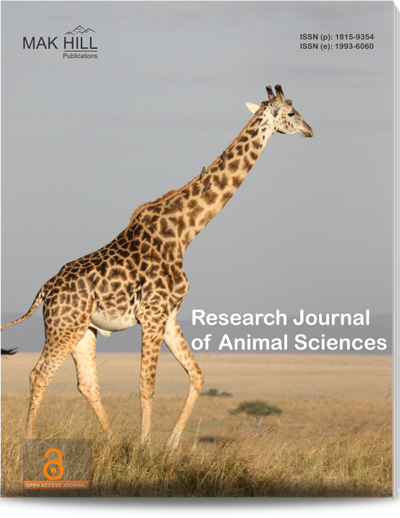
Research Journal of Animal Sciences
ISSN: Online 1994-4640ISSN: Print 1993-5269
124
Views
3
Downloads
Comparative Study Between Indigenous and Exotic Muzaffarnagari Cross-Breed Sheep under Rural Production System in Bangladesh
Mohammad Asaduzzaman, Amit Saha, Pankaj Kumar Jha, Md Golam Shahi Alam and Farida Yeasmin Bari
Page: 1-9 | Received 21 Sep 2022, Published online: 21 Sep 2022
Full Text Reference XML File PDF File
Abstract
The study aimed to assist better sheep production through comparing management, breeding system and constraints between management, breeding practices and constraints. The data of Jamuna basin indigenous (n = 40) and Muzaffarnagari cross-breeds (n = 15) sheep households were collected following the questionnaire with several visits. Flock size and ewe’s percentage was higher (64.07±4.60 vs. 9.18±0.73 and 68.63 vs. 53.68%) in Muzaffarnagari cross-breed farms while breeding rams and lambs percentage were higher (10.35 vs. 2.58% and 37.60 vs. 28.79%) in Jamuna basin indigenous farm. Kucha houses with earthen floors and semi-pacca houses with slats over the concrete floor were used for sheep households of Jamuna basin indigenous and Muzaffarnagari cross-breeds sheep. Including pasturing and grazing, 40 vs. 66.7% and 40 vs. 66.7% of farmers provide supplements in their Jamuna basin indigenous and Muzaffarnagari cross-breed sheep, respectively. Free mating was common practice with unselected flock-born rams (60%) in Jamuna basin sheep farms, whereas 100% of farmers went for rams selection in purchasing (60%) and flock born in Muzaffarnagari cross sheep farms. Diarrhea with a dog bite and parasitic infestation was remarkable constraints. Long-term commitment in farming, motivation, ram selection, selective or controlled breeding and constraints improving efforts may increase sheep production in studied areas.
How to cite this article:
Mohammad Asaduzzaman, Amit Saha, Pankaj Kumar Jha, Md Golam Shahi Alam and Farida Yeasmin Bari. Comparative Study Between Indigenous and Exotic Muzaffarnagari Cross-Breed Sheep under
Rural Production System in Bangladesh.
DOI: https://doi.org/10.36478/rjnasci.2021.1.9
URL: https://www.makhillpublications.co/view-article/1993-5269/rjnasci.2021.1.9